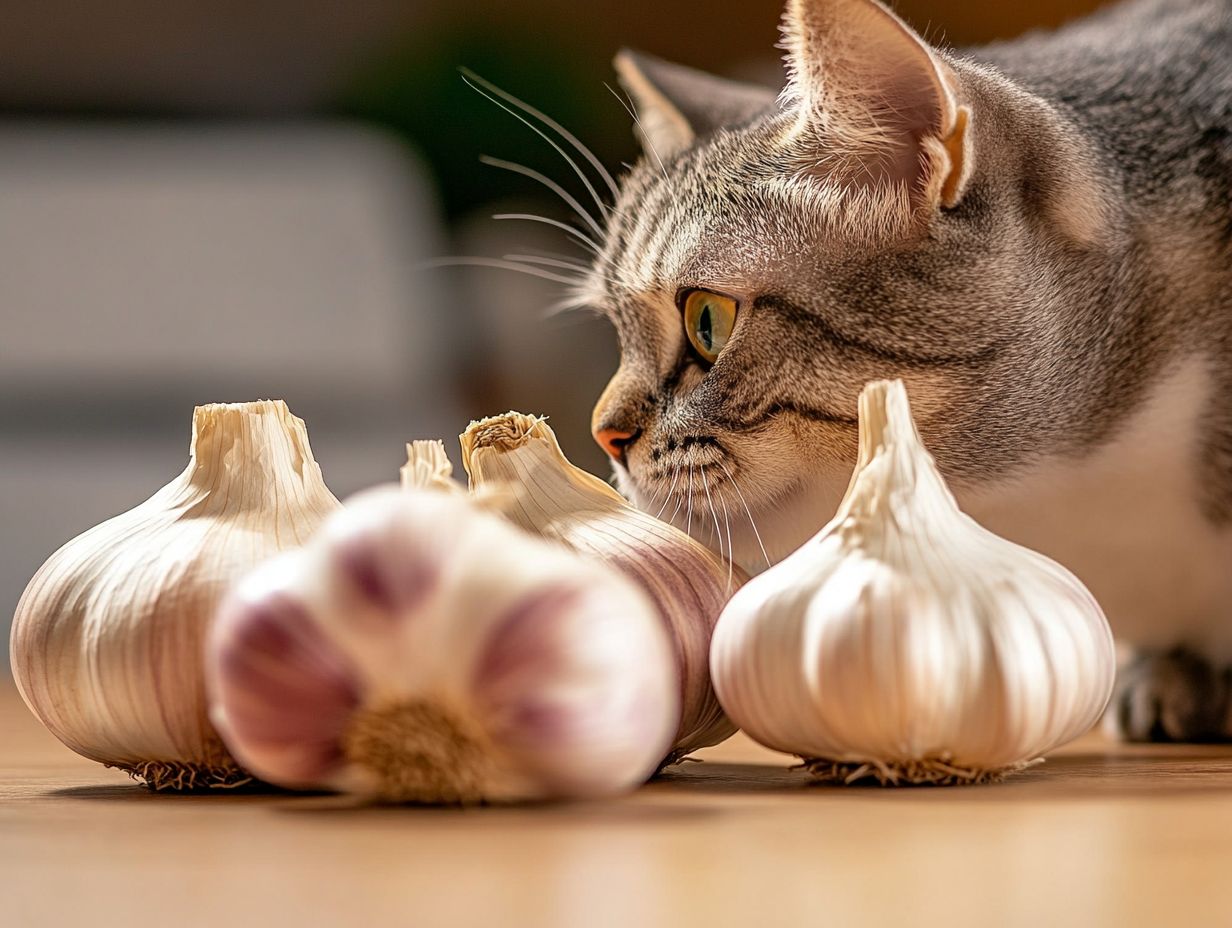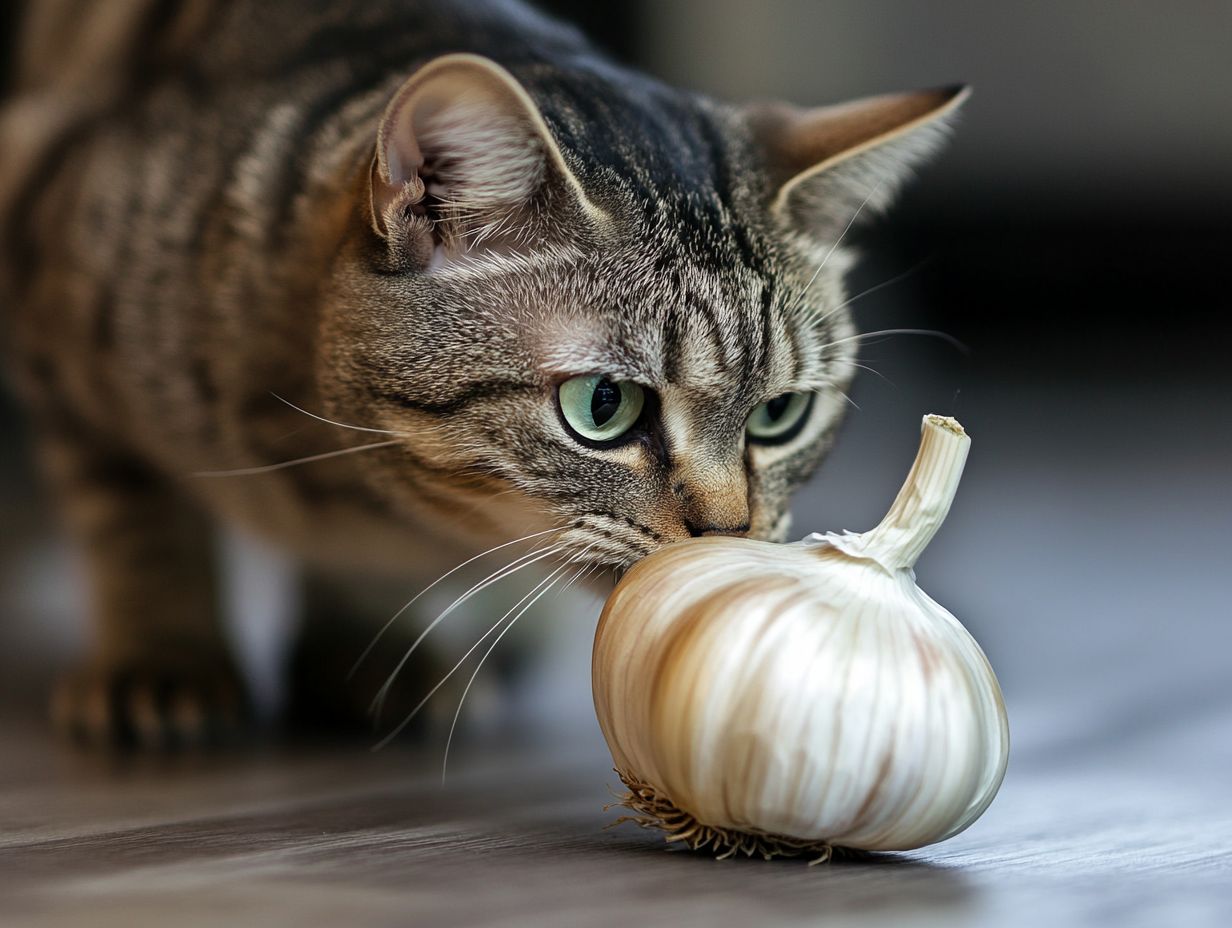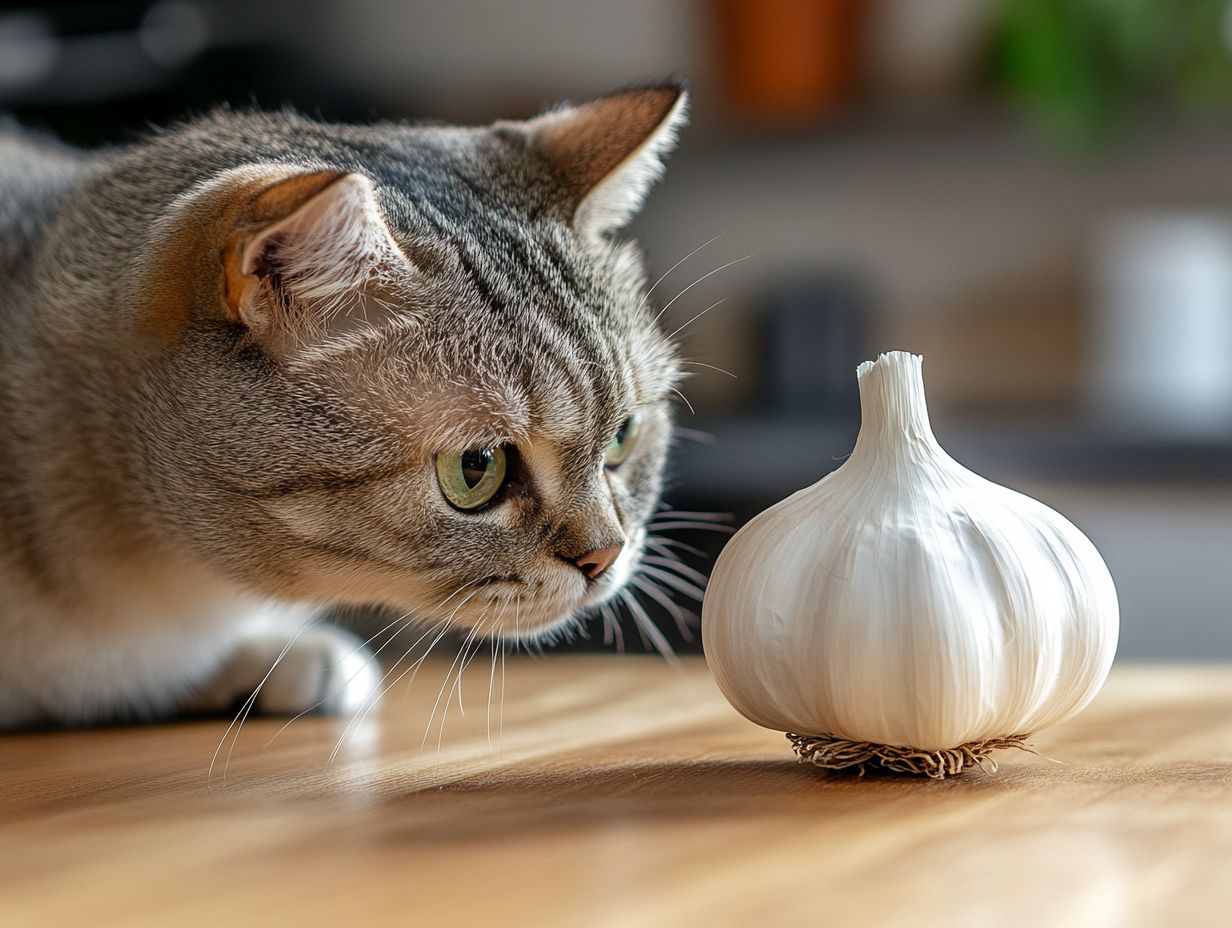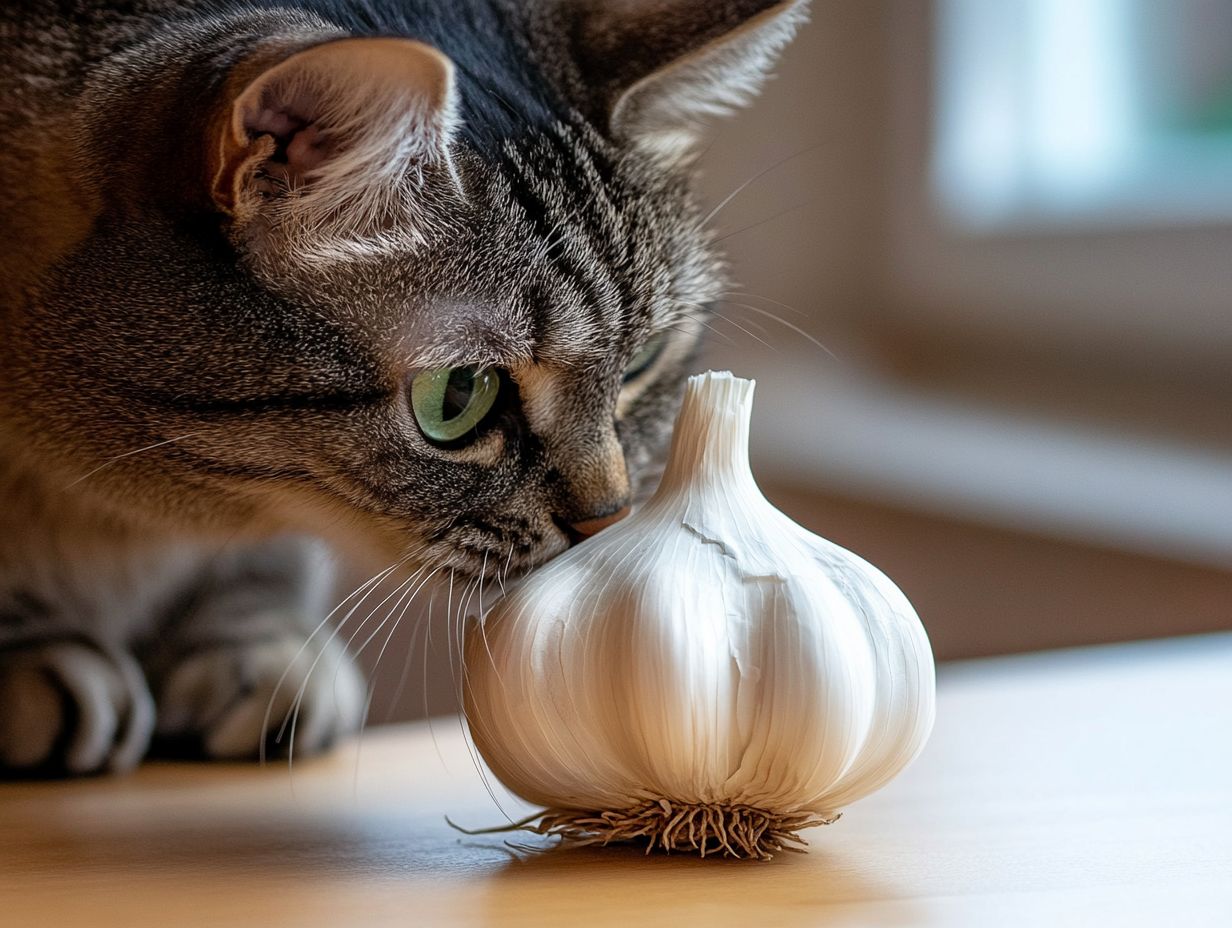Many cat owners may wonder if garlic is safe for their pets. However, garlic is highly toxic to cats and poses serious health risks. This article explores the reasons why garlic is toxic for cats, helping you identify the signs and symptoms of garlic toxicity if your pet ingests it, as well as understanding the veterinary care that may be required.
It also highlights other common foods to avoid, such as onions, scallions, and chives, and guides you through emergency steps if your cat eats garlic. Additionally, discover safe feeding practices to keep your furry companion healthy and happy, along with alternatives to harmful condiments like garlic products.
Key Takeaways:

- Garlic is toxic to cats and can lead to serious health issues, including garlic poisoning.
- Common symptoms of garlic toxicity in cats include vomiting, diarrhea, lethargy, and general weakness.
- If your cat has ingested garlic, seek emergency veterinary treatment immediately and take precautions to prevent future exposure, such as monitoring health and avoiding garlic products.
The Dangers of Garlic for Cats
Garlic (Allium sativum) is one of the most dangerous foods for cats, as it can cause garlic poisoning, leading to hemolytic anemia (a serious condition where red blood cells are destroyed faster than they can be made) and other health issues. Cats are much more sensitive to garlic than many other animals, and even small amounts can be toxic. Understanding the reasons behind garlic’s toxicity is crucial, as many may inadvertently provide their cats with garlic products, believing they offer health benefits when, in fact, they cause harm. Notably, even a single clove of garlic can be harmful to cats.
The toxicity of garlic in cats is primarily due to the thiosulfate and other sulfur compounds it contains. When ingested, these compounds can damage red blood cells, resulting in oxidative stress and their premature destruction. This process, known as hemolysis, manifests through symptoms such as weakness, lethargy, pale gums, and other indicators of anemia. Sensitive breeds, like the Turkish Angora, Burmese, Oriental Shorthair, and Siamese, face an even higher risk, necessitating close monitoring of their health and dietary intake.
Veterinary intervention is crucial; if garlic ingestion is suspected, taking the cat to a veterinarian promptly can significantly improve outcomes and prevent serious complications. It is also advisable to contact the Pet Poison Helpline or ASPCA for immediate advice.
Signs and Symptoms of Garlic Toxicity in Cats
Recognizing the signs and symptoms of garlic toxicity in cats is vital, as delayed veterinary treatment can exacerbate health issues and may even lead to death from hemolytic anemia. For more information, check out this article on whether cats can eat garlic and why it’s toxic. Experts like Laria Herod, Michael E. Peterson, and Lynn Hovda provide valuable insights on this topic.
Identifying and Addressing Symptoms
Detecting and treating garlic poisoning in cats relies heavily on the prompt actions of pet owners. Early detection significantly increases the chances of a successful veterinary response and recovery. Consulting reliable sources such as PetMD can provide additional guidance on handling such situations.
- Pet owners should be vigilant for various signs that may indicate their cat is experiencing garlic poisoning and needs immediate veterinary attention. These signs include:
- Gastrointestinal issues: vomiting or diarrhea
- Lethargy: general weakness or fatigue
- Excessive drooling
- Lack of appetite
- Changes in behavior
If you observe any changes in your cat’s behavior or appetite, consult your veterinarian right away.
Emergency Steps
If you suspect your cat has ingested garlic, follow these immediate actions:
- Assess the amount consumed.
- Contact your veterinarian or a poison control center.
- Do not induce vomiting unless instructed.
Additionally, always check the ingredient list of cat treats and human food to ensure they do not contain garlic or any members of the Allium family.
Garlic toxicity is a serious concern for cat owners. Understanding the dangers of garlic and other harmful foods is crucial to ensuring your cat’s well-being. Pet owners must be vigilant about their cat’s diet and recognize the hidden dangers in everyday foods.
Your veterinarian may recommend tests such as blood work or urinalysis to assess the cat’s organ function and electrolyte levels. Alongside the initial treatment, ongoing health monitoring is crucial to ensure the cat’s recovery and adjust the treatment plan as needed.
Other Foods that are Toxic for Cats

Many common foods are toxic to cats, making it essential to be aware of these harmful items for their well-being. Along with garlic, foods from the Allium family, such as onions, scallions, shallots, and chives, should be avoided.
Benefits of Safe Feeding
Ensuring a healthy diet for cats not only prevents toxicity but also promotes overall health. Choosing safe ingredients can enhance your cat’s vitality and longevity.
Common Foods to Avoid Feeding Cats
When considering a healthy diet for their cats, pet owners should be aware of common foods that should not be fed to them, particularly those that are harmful. Among these, garlic powder and garlic salt are often hidden in sauces and commercial pet foods and should be avoided, as even garlic powder can be harmful.
Additionally, pet owners must steer clear of feeding their cats onions, chocolate, and caffeine, as these substances can negatively impact their health. Grapes and raisins pose another risk, as they can lead to acute kidney failure. Even cooked food containing these ingredients should be avoided.
Processed items like deli meats and flavored snacks may contain additives and preservatives that can be detrimental to a cat’s well-being. As responsible pet owners, reading labels carefully is an effective way to maintain a healthy and natural diet for their cats.
What to Do if Your Cat Eats Garlic
If you suspect that your cat has ingested garlic, it is crucial to take immediate emergency action. This can help minimize the risk of garlic toxicity and ensure that your cat receives the best possible veterinary care from facilities like the Animal Medical Center in New York or the VCA Animal Hospitals network.
Emergency Steps and Treatment Options
When treating garlic poisoning in cats, it is crucial to understand the emergency steps and treatment options available, as timely veterinary intervention can significantly influence the recovery process. Consulting experts like Laria Herod and Michael E. Peterson can provide valuable insights.
Veterinary professionals typically recommend administering activated charcoal to limit the absorption of toxins, along with IV fluids to maintain hydration and support kidney function. Continuous monitoring of vital signs and overall health through advanced diagnostic tools is essential after treatment, as symptoms may worsen.
Facilities like the Animal Medical Center in New York and the VCA Animal Hospitals network are recognized for their expertise in managing such cases. These practices employ advanced diagnostic tools and have experienced staff to ensure that affected cats receive the appropriate care and necessary follow-up assessments vital for successful recovery.
Preventing Garlic Toxicity in Cats

Garlic toxicity in cats can be prevented, and safe feeding practices significantly reduce the risk of inadvertently feeding garlic products to them. Avoiding harmful condiments is essential to ensure their well-being.
Safe Feeding Practices and Alternatives
Ensuring your cat’s diet is free from garlic and other harmful condiments is crucial for their health. Always opt for safe feeding practices and consult your veterinarian for the best dietary advice. Look for hidden ingredients in labels such as garlic powder and garlic salt, and be cautious with prepared foods.
Portion Sizes
To minimize the risk of garlic exposure, even small portions of human food should be avoided. Always consult your veterinarian for appropriate serving sizes for your cat, especially regarding any new foods introduced into their diet.
Frequently Asked Questions
Can cats eat garlic?
No, cats should not eat garlic. It is toxic for them and can cause serious health issues, including garlic poisoning.
Why is garlic toxic for cats?

Garlic contains compounds that can damage a cat’s red blood cells, leading to anemia. Symptoms of garlic toxicity may include weakness, vomiting, and diarrhea. If you suspect garlic ingestion, consult your veterinarian immediately.
Conclusion
Pet owners must monitor their cat’s diet closely and consult a veterinarian regarding any concerns. Knowledge about foods toxic to cats and proper nutrition can help ensure a long, healthy life for your feline friend. Share this information with other cat owners to spread awareness and promote pet safety.
Garlic contains a compound called N-propyl disulfide, which can damage a cat’s red blood cells and lead to hemolytic anemia. For more information, consult trusted veterinary sources.
How much garlic is toxic for cats?
The amount of garlic that can be toxic for a cat depends on their size and weight. Even a small amount, typically less than 1 gram per kilogram of body weight, can cause harm. It’s best to avoid giving them any garlic at all.
What are the symptoms of garlic toxicity in cats?
The symptoms of garlic toxicity in cats can include:
- Vomiting
- Diarrhea
- Weakness
- Lethargy
- Difficulty breathing
- Organ failure (in severe cases)
Can cats eat food containing garlic powder?
No, cats should not consume any food that contains garlic, even in small amounts or in powder form. All forms of garlic are toxic for cats.
What should I do if my cat accidentally eats garlic?
If your cat has consumed garlic, it’s important to seek veterinary care immediately. While waiting for help, keep your cat calm and monitor their symptoms. Your vet may induce vomiting or provide supportive care to prevent any serious health complications. Contacting the Pet Poison Helpline or ASPCA can provide immediate assistance.
Preventing Garlic Exposure
To keep your cat safe from garlic, follow these tips:
- Always check food labels for garlic or garlic powder.
- Avoid feeding your cat human foods that may contain garlic.
- Educate friends and family about garlic toxicity in cats.
Conclusion
Garlic is dangerous for cats, and even small amounts can lead to serious health issues. It’s crucial to consult with your veterinarian regarding dietary choices to ensure your cat’s safety. Regular veterinary check-ups can help prevent accidental exposure to toxic substances.